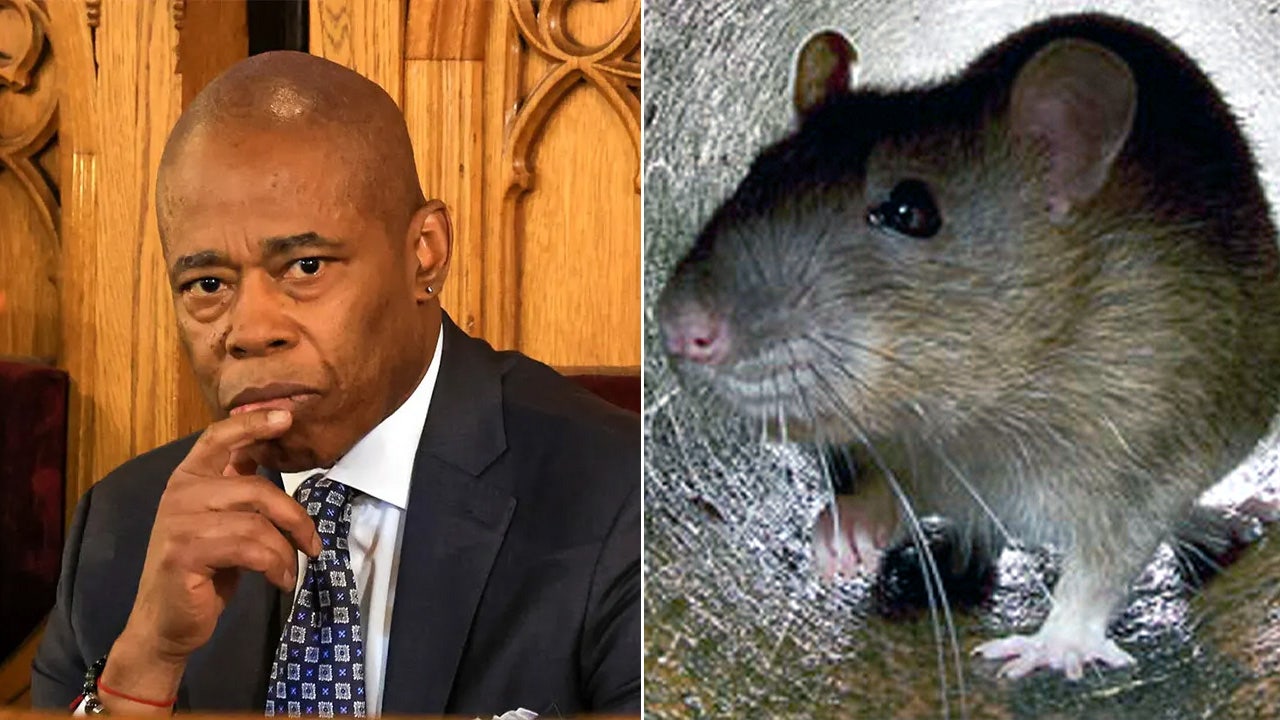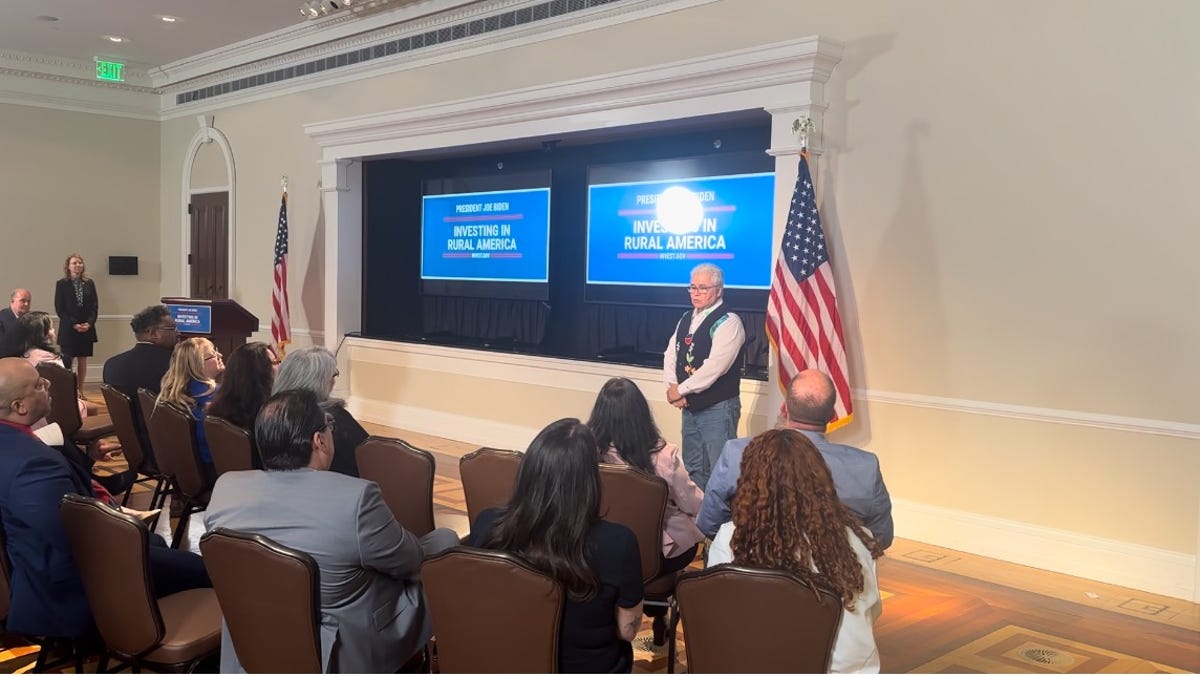South Dakota
Navajo leaders outraged after a Lakota student’s tribal regalia was removed at graduation • South Dakota Searchlight

Graduation season is typically a time for celebrating the success of students making it through their education programs.
For some Indigenous students, part of that celebration includes having tribal regalia or objects of cultural significance as part of their cap and gown during the graduation ceremony.
In Arizona, Indigenous students are protected under state law. In 2021, then-Gov. Doug Ducey signed House Bill 2705 into law, barring public schools from preventing Indigenous students from wearing traditional tribal regalia or objects of cultural significance at graduation ceremonies.
Not all states have similar laws to protect Indigenous students. New Mexico’s lawmakers say they passed legislation to prevent incidents like this from occurring, but it’s now unclear if that applies to a case garnering attention in Farmington, New Mexico.
On May 13, Genesis White Bull, a Hunkpapa Lakota of the Standing Rock Sioux tribe, was standing for the national anthem alongside her graduating class at the Farmington High School graduation ceremony when two unidentified school faculty members approached her to confiscate her graduation cap.
In video footage shared across social media, White Bull is seen being instructed to remove her graduation cap, which was embellished with an eagle plume and beaded around the rim.
Brenda White Bull, Genesis’ mother, shared the experience with the Navajo Nation Council and reported that school officials later cut the plume from her daughter’s cap using scissors.
The Navajo Nation Council stated in a press release that Brenda emphasized the sacred significance of the plume, which symbolizes achievement and cultural identity, marking Genesis’ transition into new phases of her life.
The Arizona Mirror contacted the family for an interview, but the family did not respond before publication.
‘No place for this type of behavior’
Navajo Nation Council Speaker Crystalyne Curley called Farmington High School’s actions “belittling, humiliating, and demeaning to the student and her family.
“There is no place for this type of behavior in our educational systems,” Curley said in a press release. “The school officials owe an apology to the student and her family.”
Noem doubles down on cartel talk, asks tribes to partner with state
Farmington Municipal Schools, which oversees Farmington High School, released a statement on May 15 in response to the incident.
“During the event, a student’s beaded cap was exchanged for a plain one. The feather was returned intact to the family during the ceremony,” Farmington Municipal Schools wrote in the statement. “The beaded cap was returned after graduation concluded.”
Farmington Municipal Schools referred to the district’s protocols, which state that graduation caps and gowns can not be altered, per the 2023-2024 Student and Parent Handbook.
The handbook does not contain policy language stating any exceptions to these rules. However, the school’s statement noted that students could choose their clothing attire, which included traditional attire to be worn under the graduation cap and gown, regalia, stoles, and feathers in their tassels.
“Students were informed throughout the school year and immediately before graduation of the protocol, including that beaded caps were not allowed,” the statement read. “This standard process helps us set student attire during graduations.”
“While the staff involved were following district guidelines, we acknowledge this could have been handled differently and better,” the statement read. “Moving forward, we will work to refine our processes at the school level.”
Farmington Municipal Schools stated that the district is also committed to exploring policies that allow for additional appropriate cultural elements in student attire. Indigenous students comprise nearly 34% of the school district’s population.
“School officials across the country need to be reminded who the first Americans are and whose land they inhabit,” Curley said in a press release. “No student in any school should be prohibited from wearing regalia that signifies their cultural and spiritual beliefs.”
Law under review
New Mexico passed an anti-discrimination law in 2021 that might protect students against the Farmington schools district policy.
However, the legal pathway is unclear according to responses from spokespeople in the governor’s offices, state education department, and even lawmakers who wrote the recent law.
Each acknowledged that they were reviewing the law and could only give an official opinion once that was completed. Requests for comment were made to the New Mexico Department of Justice but were not returned in time for publication.
Sen. Harold Pope (D-Albuquerque), who co-sponsored the law, said the legislation stemmed from the national Crown Act push that targeted to stop policies that discriminate against hair style and texture, with a significant tilt against African Americans.
New Mexico’s version was written from the views of the Native American cultures present throughout the state, Pope said, and the bill included co-sponsors who are Dińe and Jemez Pueblo.
“We wanted to make sure that we included cultural and religious headdresses to be even more inclusive than your hair alone,” he said. “And what I think is important in that language, when we look at Indigenous cultures, feathers are so cherished and protected and it is part of who they are.”
It’s unclear now if the law will provide White Bull support for any legal action she could take against Farmington Municipal Schools District.
‘It broke my heart’
After footage of White Bull’s graduation experience spread on social media, it sparked an outpouring of support from Indigenous people and communities across the country.
Navajo Nation leaders have voiced their support for White Bull and called for schools to support an Indigenous student’s right to wear regalia during their graduation ceremonies, saying denying it is a violation of their rights.
“It broke my heart,” Navajo Nation Council Delegate Amber Crotty told the Arizona Mirror when she learned what happened to the student.
After Lower Brule vote, eight of nine tribes have endorsed Noem ban
Crotty said graduations are meant to be one of the happiest moments of a student’s life, and White Bull’s experience was tarnished by having something so important taken away from her.
“That’s so traumatic and not the best way to approach these situations when it comes to our Native students,” Crotty said. “In a day of celebration, just for her to be attacked like that.”
Crotty said the incident has been reported to the Nation Human Rights Commission, which investigates discrimination within border towns.
Farmington borders the Navajo Nation, and there is a documented history of racism against Indigenous people living or visiting the city.
In April 1974, three white Farmington High School students brutally murdered four Navajo men as part of a practice locals called “Indian rolling.”
In response to the murders, Navajo and other Indigenous people held protests in the city of Farmington denouncing the pervasive racism and bigotry of the community.
Due to escalating tensions in Farmington, the New Mexico Advisory Committee to the U.S. Commission on Civil Rights launched a study of the relationships between the city, San Juan County and the Navajos living in the community and on the Navajo Nation.
The committee concluded that Indigenous people in almost every area suffer from injustice and maltreatment, according to their report. They recommended that city officials and San Juan County officials, in conjunction with Navajo leaders, work together to develop a plan of action to improve the treatment of Navajos living in the border areas of northwestern New Mexico.
The advisory committee conducted another report 30 years later and found that, while race relations may have somewhat improved in the area, racism is still an issue within the city of Farmington.
“There is a lack of understanding of how Native students identify themselves and celebrate themselves,” Crotty said.
She said that it is time to move beyond having conversations about cultural sensitivity for Native students, mainly because incidents like this keep occurring.
“That’s why we want to support mom and the family,” Crotty said. “She does want the school to be accountable, and she does want some sort of apology.”
Crotty said the staff’s actions at Farmington High School were inappropriate, and immediate action is needed rather than the school trying to justify what happened.
“The cultural identity of all Native American students attending Farmington High School are protected under the New Mexico Indian Education Act,” she said, adding that what happened was a clear violation of the student’s rights.
“As we move forward in addressing this issue, we will be meeting with the school board and administration,” Crotty added.
In New Mexico, the law passed in 2021 is directed specifically to local school districts, but it does not allow the New Mexico Public Education Department to issue any statewide order on local issues, such as what students can wear at graduation ceremonies.
New Mexico’s 89 school districts decide on those policies, which is why other Indigenous students across the state have different experiences with graduation attire.
New Mexico’s Public Education Secretary, Dr. Aresenio Romero, offered support for White Bull but noted that the issue is the responsibility of the local district.
“I expect the Farmington Superintendent and school district to reevaluate their graduation policies,” Romero said. “I remain committed to promulgating tribal sovereignty and to respecting tribal cultural customs and practices.”
Governor issues statement
Gov. Michelle Lujan Grisham issued a statement Friday saying that it was unacceptable that a student was reprimanded for representing their culture during a time of celebration.
“I appreciate that the Farmington schools acknowledge that they could have handled this situation better and that their policy may be too restrictive,” she added. “However, it shouldn’t have required the student raising this issue for a school to recognize its lack of inclusivity.”
Navajo Nation First Lady Jasmine Blackwater-Nygren released a statement supporting Indigenous graduating students who wear their cultural and traditional regalia during graduation.
“We stand with our Native graduates this graduation season and their decision to wear their traditional tribal regalia or objects of cultural significance, including eagle feathers, eagle plumes, and beaded graduation caps,” Blackwater-Nygren said in a statement she posted on her Facebook. “Our graduates and families take immense pride in what they choose to wear on graduation day.”
Blackwater Nygren was a guest speaker at the Farmington High School graduation, but she said she was unaware of what occurred until after the graduation.
“I am deeply disappointed that this happened at a school where we have many Navajo and Native graduates,” she said. “I hope the school learns from this experience and can take corrective measures.”
Blackwater-Nygren said that, for many Indigenous students, deciding what to wear goes far beyond simply deciding what color dress or shoes to wear. For some Indigenous students, it is a day for them to wear their traditional regalia proudly.
“Our regalia reminds us of how far we’ve come as a people; it shows our pride in our culture and how we chose to identify ourselves as Native people,” she said. “Some graduates are the first in their families to graduate or are only one of a few high school graduates in the family. A beaded cap further signifies this symbol of achievement, accomplishment and Native resilience.”
Blackwater-Nygren is familiar with this issue because, as an Arizona State Representative, she helped pass House Bill 2705 through the legislature.
“As graduation season continues, I hope all schools will respect the decision of our Native students to wear their traditional regalia and objects of cultural significance,” Blackwater-Nygren said.

South Dakota
Republican factions fighting for control of the party in Tuesday’s primary election • South Dakota Searchlight

Most of the action in Tuesday’s South Dakota primary election is in Republican legislative races, where a fight for control of the party has drawn in players ranging from upstart challengers to fundraising groups affiliated with members of Congress.
There are 44 Republican legislative primary races across the state, and only one Democratic legislative primary. Winners will go on to represent the party in the Nov. 5 general election, when all 105 seats in the Legislature will be up for grabs.
Republicans currently hold all but 11 of 105 legislative seats, and their grip on the majority is not in doubt. But the party’s direction could be influenced by Tuesday’s results, many of which will be the final result. Among 35 districts, 16 of them lack general election contests for House seats and 20 lack general election contests for Senate seats, due to candidates running unopposed or one party (mostly Democrats) failing to field a candidate. In other words, in some districts, the primary election is the de facto general election.
One of the Republicans trying to influence the primary results is Toby Doeden, who considered challenging Republican U.S. Rep. Dusty Johnson but decided against it. Doeden has since launched Dakota First Action, a political action committee aiming to remove “fake Republicans and their whole crony crowd” from the state House of Representatives, replacing them with “America First” candidates, according to Doeden.
“Then we’ll take the Senate and governor’s office,” Doeden said, referring to future elections.
Doeden contributed $100,000 of his own money to the committee and reported it as a donation, according to a campaign finance report. After online commenters pointed out the $10,000 limit on individual contributions to political action committees, Doeden said the contribution should have been reported as a loan, not a donation.
Pat Powers, a Republican blogger, has filed an affidavit alleging Doeden is “flagrantly violating” campaign finance laws. Powers also published correspondence from Attorney General Marty Jackley indicating that Jackley’s office is investigating.
As of the last filing deadline, Doeden’s committee had spent $25,000 on “data acquisition,” and recently sent text messages to District 25 voters alleging a Republican candidate he dislikes is a liberal in disguise.
Another political action committee seeking to challenge the Republican establishment in Pierre is Spearfish Republican Rep. Scott Odenbach’s Liberty Tree. It spent $58,000 ahead of the primary.
Former executive director of Rapid City Catholic Social Services Jim Kinyon’s Protecting SD Kids donated $37,000 to similar candidates, as did anti-abortion activists’ South Dakota Right to Life PAC, spending $11,600. The PAC is affiliated with the nonprofit South Dakota Right to Life, which includes Rep. Jon Hansen, R-Dell Rapids, Rep. Fred Deutsch, R-Watertown, Sen. Al Novstrup, R-Aberdeen, and former representative and current candidate Spencer Gosch on its board.
None of the money spent by those committees went to Republican candidates currently serving in legislative leadership positions.
One such Republican, former state senator Tom Dempster, of Sioux Falls, warns that confrontational politics within the party will contribute to further divides in an already divided country.
“We have way too many candidates on the fringe that want people to rally around them because they simply want to upset the system,” Dempster said. “It’s just the opposite of what our democracy needs today. We need people who know how to handle conflict and pull people together.”
The kinds of candidates Dempster favors are receiving help in the primary from longtime Republican state lawmaker Lee Schoenbeck, of Watertown, who isn’t seeking reelection. He founded a political action committee in 2021, South Dakota Strong. The committee spent $46,000 on nine candidates ahead of this primary, according to its campaign finance report.

Schoenbeck said today’s Republican party consists of two different groups of people.
“There are the normal Republicans, and there are these strange individuals who are not conservative. They’re just unusual,” Schoenbeck said. “But they turn out big in primary elections. So, if normal, regular-thinking conservative folks don’t vote in this primary, the highly unusual folks will win.”
Mort PAC, run by House Majority Leader Will Mortenson, R-Fort Pierre, spent $48,271 to help some of the same candidates. It received $10,000 from Republican U.S. Sen. Mike Rounds’ Peter Norbeck Leadership PAC and $10,000 from Republican U.S. Sen. John Thune’s Heartland Values PAC.
Dusty PAC, managed by supporters of U.S. Rep. Dusty Johnson, donated $25,750 to many of the same candidates and more.
Dakota Legacy PAC, run by Senate Majority Leader Casey Crabtree, R-Madison, took a similar approach, giving $16,700 to candidates and spending $10,000 on advertising. The committee also received $10,000 apiece from Thune’s and Rounds’ PACs.
Following are summaries of some races that people on both sides of the Republican divide say they’re watching closely.
House of Representatives
In state House of Representatives primaries, the top two vote-getters from each party advance to the general election, where they will vie for two House seats in each legislative district.
District 18 (Clay, Yankton counties): Incumbents Mike Stevens and Julie Auch, and challenger John Marquardt, all of Yankton.
Auch received money from South Dakota Right to Life PAC and a 91.7% scorecard rating from South Dakota Citizens for Liberty, a group that says it advocates for limited government. Stevens received money from Dusty PAC and a 33.3% rating on the Citizens for Liberty scorecard.
Meanwhile, Auch received a D rating from a scorecard published by the Republican blogger Powers, the Real Conservative Scorecard, and Stevens received a B+ rating.
Yankton County Commission Chairman Marquardt received donations from Mort PAC and Dusty PAC.
District 13 (Lincoln, Minnehaha counties): Incumbent Tony Venhuizen and challengers Brad Jankord, John Hughes and Penny BayBridge, all of Sioux Falls. There is no Democratic or independent candidate, which means the two Republican primary winners will win the two House seats.
Venhuizen formerly served as chief of staff for Governors Kristi Noem and Dennis Daugaard and has been involved in Republican state politics for many years.

Jankord received donations from Dusty PAC, Mort PAC, former Gov. Dennis Daugaard, Venhuizen and others, totaling over $60,000.
Hughes has received funding from Odenbach’s Liberty Tree, South Dakota Right to Life PAC, Protecting SD Kids and others, totaling over $40,000.
BayBridge took in $4,703 from various individuals.
With Venhuizen taking in over $100,000, plus the fundraising by other candidates, the district’s primary election is the most expensive South Dakota Searchlight found.
District 9 (Minnehaha County): Incumbent Bethany Soye, of Sioux Falls, and challengers Kristi Golden, Daryl Christensen and Tesa Schwans, all of Hartford.
Soye has a 97.5% Citizens for Liberty rating and contributions from Liberty Tree, South Dakota Right to Life PAC and Protecting SD Kids. She was given a D rating on the Real Conservative Scorecard.
Schwans received donations from South Dakota Right to Life PAC, Protecting SD Kids and Liberty Tree.
Golden received donations from Dusty PAC and Mort PAC, and Christensen received donations from Venhuizen and Daugaard.
District 2 (Minnehaha County): Incumbents John Sjaarda, of Valley Springs, and David Kull, of Brandon, face challenger Jake Schoenbeck, of Sioux Falls. There is no Democratic or independent candidate, which means the two Republican primary winners will win the two House seats.
Sjaarda has an 87.5% Citizens for Liberty rating and contributions from Liberty Tree and Protecting SD Kids. Schoenbeck is the son of longtime legislative leader Lee Schoenbeck (who isn’t seeking reelection). South Dakota Strong gave Jake Schoenbeck $5,000. He also received contributions from Mort PAC and Dusty PAC.
Kull has an A rating on the Real Conservative Scorecard and received donations from Dusty PAC and Mort PAC.
District 21 (Aurora, Charles Mix, Douglas, Gregory and Tripp counties): Incumbent Marty Overweg, of New Holland, and challengers Lee Qualm, of Platte, and Jim Halverson, of Winner. There is no Democratic or independent candidate, which means the two Republican primary winners will win the two House seats.
Overweg has a 97.5% Citizens for Liberty rating and contributions from Liberty Tree and South Dakota Right to Life PAC. Qualm, a former legislator, also has Liberty Tree and South Dakota Right to Life PAC contributions, plus an endorsement from Dakota First Action.
Halverson, whose daughter is involved with U.S. Rep. Dusty Johnson’s reelection campaign, received donations from Dusty PAC and Mort PAC.
District 23 (Brown, Campbell, Edmunds, Faulk, Hand, McPherson, Potter, Walworth counties): Incumbents Scott Moore, of Ipswich, and Majority Whip James Wangsness, of Miller, and challenger Spencer Gosch. There is no Democratic or independent candidate, which means the two Republican primary winners will win the two House seats.
Gosch previously served as speaker of the House. He received contributions from Protect SD Kids, Liberty Tree and a PAC affiliated with the South Dakota Freedom Caucus, whose members sometimes clash with Republican legislative leaders.
Wangsness has an A+ rating on the Real Conservative Scorecard and received contributions from Dusty PAC and Mort PAC.
Moore’s pre-primary finance report includes donations from Dusty PAC, Protecting SD Kids and the South Dakota Freedom Caucus PAC.
Senate
In state Senate primaries, only the top vote-getter from each party advances to the general election to vie for one Senate seat in each legislative district.
District 16 (Lincoln, Turner, Union counties): Kevin Jensen vs. Eric Hohman, both of Canton. There is no Democratic or independent candidate, which means the Republican primary winner wins the seat.
Jensen, a current state representative, is term-limited in the House. He has an 83.3% Citizens for Liberty rating and a contribution from Liberty Tree and South Dakota Right to Life PAC.
Hohman’s campaign has received contributions from Lee Schoenbeck’s South Dakota Strong PAC, Senate Majority Leader Casey Crabtree’s Dakota Legacy PAC and the Dusty PAC.
District 3 (Brown County): Carl Perry vs. Katherine Washnok, both of Aberdeen. There is no Democratic or independent candidate, which means the Republican primary winner wins the seat.
Current state representative Perry is attempting a switch to the Senate against Brown County Republican Chair Washnok.
Washnok says she “grew up in” the state Republican Party. She has a contribution from Dakota Legacy PAC and Dusty PAC.
Perry has a 75% SD Citizens for Liberty rating, a Dakota First Action endorsement, and checks from Liberty Tree and South Dakota Right to Life PAC.
District 30 (Custer, Fall River, Pennington counties): Incumbent Julie Frye-Mueller, of Rapid City, vs. Amber Hulse, of Hot Springs, and Forrest Foster, of Rapid City.
Frye-Mueller is one of two Republicans with a 100% rating from Citizens for Liberty. The state Senate censured Frye-Mueller in 2023. She had allegedly verbally harassed a Legislative Research Council staffer, including criticism of the staffer’s decision to have her baby vaccinated.

Hulse is a lawyer and former Miss South Dakota who worked as an intern in President Donald Trump’s administration. She received a donation from Dusty PAC.
Foster received $1,600 ahead of the primary, including $1,000 from himself.
District 8 (Brookings, Kingsbury, Lake, Miner counties): Incumbent Casey Crabtree, of Madison, vs. Rick Weible, of Elkton. There is no Democratic or independent candidate, which means the Republican primary winner wins the seat.
Crabtree is the Senate majority leader and reports taking in about $69,000 on his pre-primary finance report. He has a 31.8% rating from Citizens for Liberty.
Weible is a leader in attempts to get rid of vote-counting machines and force hand-counting. He received a donation from the South Dakota Freedom Caucus and took in $6,000 total.
District 4 (Clark, Codington, Deuel, Grant, Hamlin and Roberts counties): Fred Deutsch, of Florence, vs. Stephanie Sauder, of Bryant. There is no Democratic or independent candidate, which means the Republican primary winner wins the seat.
With term limits forcing John Wiik out of the Senate, current representatives Deutsch and Sauder are seeking the open seat.
Deutsch has a 66.7% Citizens for Liberty rating and received donations from South Dakota Right to Life PAC and Protecting SD Kids. Sauder has a 43.5% Citizens for Liberty rating and contributions from South Dakota Strong and Dusty PAC.
District 35 (Pennington): Incumbent Mike Walsh, of Box Elder, vs. challengers Greg Blanc and Curtis Nupen, both of Rapid City. There is no Democratic or independent candidate, which means the Republican primary winner wins the seat.
Walsh was appointed to an open seat this year by Gov. Kristi Noem. He has a contribution from South Dakota Strong. Blanc has contributions from Liberty Tree and South Dakota Right to Life PAC. Nupen gave himself $6,000.
District 34 (Pennington): Jason Green vs. Taffy Howard, both of Rapid City.
With incumbent Michael Diedrich not seeking reelection, former legislator Howard is seeking a return to the Legislature. She is a former primary challenger to U.S. Rep. Dusty Johnson, whom she described as insufficiently conservative. She has contributions from Liberty Tree, South Dakota Right to Life PAC and Protecting SD Kids, and a Dakota First Action endorsement.
Green is endorsed by outgoing Sen. Diedrich and received donations from Dusty PAC and Lee Schoenbeck.
District 25 (Minnehaha and Moody counties): Incumbent Tom Pischke, of Dell Rapids, vs. challenger Jordan Youngberg, of Colman.
Pischke has an 80.7% rating from Citizens for Liberty, a contribution from Liberty Tree and a Dakota First Action endorsement. He made statewide news for being banned from the House during the last days of the most recent legislative session for a breach of decorum.
Youngberg, a former legislator, has contributions from South Dakota Strong and Dusty PAC.
District 17 (Clay and Union counties): Incumbent Sydney Davis, of Burbank, vs. Jeffrey Church, of Vermillion. There is no Democratic or independent candidate, which means the Republican primary winner wins the seat.
Church has contributions from Liberty Tree and Protecting SD Kids, and is highlighting Davis’ 20% Citizens for Liberty rating in his campaign material. Davis has donations from Dusty PAC and others totaling about $39,000.
District 9 (Minnehaha County): Joy Hohn, a vocal opponent of eminent domain for carbon dioxide pipelines, faces off with former representative Mark Willadsen. There is no Democratic or independent candidate, which means the Republican primary winner wins the seat.
Doeden’s Dakota First Action endorsed Hohn, and she has donations from Liberty Tree and South Dakota Right to Life PAC.
Willadsen has donations from Dusty PAC, former Gov. Daugaard, and former speaker of the state House, Mark Mickelson.
South Dakota
State-U rivalry game among several national television dates for SDSU & USD football

SIOUX FALLS, S.D. (Dakota News Now) – The Rushmore State’s biggest rivalry will have it’s biggest stage ever this October.
ESPN announced their television schedule and, as part of a new deal with the Missouri Valley Football Conference to televise two of the league’s games nationally each season on one of their linear networks, October 26th’s game between South Dakota and South Dakota State from Dana J. Dykhouse Stadium in Brookings will be nationally televised.
Kickoff time and which ESPN channel will carry the game will be announced at a later date.
Dating back to 1889, the oldest State-U rivalry game in the United States will have it’s 117th meeting this year with SDSU looking to win their third straight in the series. In what was a battle of top five ranked teams in the FCS last year the top-ranked Jackrabbits, who went on to win their second straight FCS National Championship, rolled to victory at fourth-ranked South Dakota 37-3 on October 28th.
In fact both teams will be getting some additional exposure across the country this fall. We thought SDSU’s game at Oklahoma State might get moved or nationally televised but as of now it’s still set for Saturday, August 31st, and can be streamed on ESPN Plus and Big 12 now. In addition to the USD game, the Dakota Marker game the week prior against North Dakota State in Fargo will also be televised on an ESPN network. The Jacks have won five straight games against the Bison including their 2022 FCS National Championship Game meeting in Frisco, Texas. In their most recent meeting on November 4th, 2023, SDSU whipped NDSU 33-19 to hoist the Dakota Marker for the fourth straight time (the trophy was not in play during the National Championship).
The Coyotes will also get a second nationally televised game with their September 7th game at Wisconsin set for FS 1. That’s also the only game with a known kickoff time at 2:30 central. The rest will be announced later.
Copyright 2024 Dakota News Now. All rights reserved.
South Dakota
Wyoming man pleads guilty to shooting at South Dakota Highway Patrol Trooper

RAPID CITY, S.D. (KEVN) – South Dakota Attorney General Marty Jackley announced that a Wyoming man has pleaded guilty to shooting at a Highway Patrol Trooper during an incident at the 2023 Sturgis Motorcycle Rally.
Wyatt James Fluty, 29, pleaded guilty to one count of attempted first-degree murder and one count of commission of a felony while armed with a firearm.
The remaining four charges were dismissed as part of a plea bargain.
Fluty is set to be sentenced on July 17 in Meade County Circuit Court and faces up to 75 years in prison.
Previous stories on Wyatt Fluty
See a spelling or grammatical error in our story? Please click here to report it.
Do you have a photo or video of a breaking news story? Send it to us here with a brief description.
Copyright 2024 KEVN. All rights reserved.
-

 News1 week ago
News1 week agoRead the I.C.J. Ruling on Israel’s Rafah Offensive
-

 World1 week ago
World1 week ago€440k frozen in Italy over suspect scam by fake farmers
-

 News1 week ago
News1 week agoVideo: Protesters Take Over U.C.L.A. Building
-

 World1 week ago
World1 week agoHoping to pave pathway to peace, Norway to recognise Palestinian statehood
-

 News1 week ago
News1 week agoLegendary U.S. World War II submarine located 3,000 feet underwater off the Philippines
-

 Politics1 week ago
Politics1 week agoAOC demands Senate Democrats investigate reports of Jan. 6 flags flown at Supreme Court Justice Alito's home
-

 Politics1 week ago
Politics1 week agoNYC Mayor Eric Adams announces Urban Rat Summit to combat rodent crisis: 'I hate rats'
-

 Science1 week ago
Science1 week agoSecond human case of bird flu detected in Michigan dairy worker
















